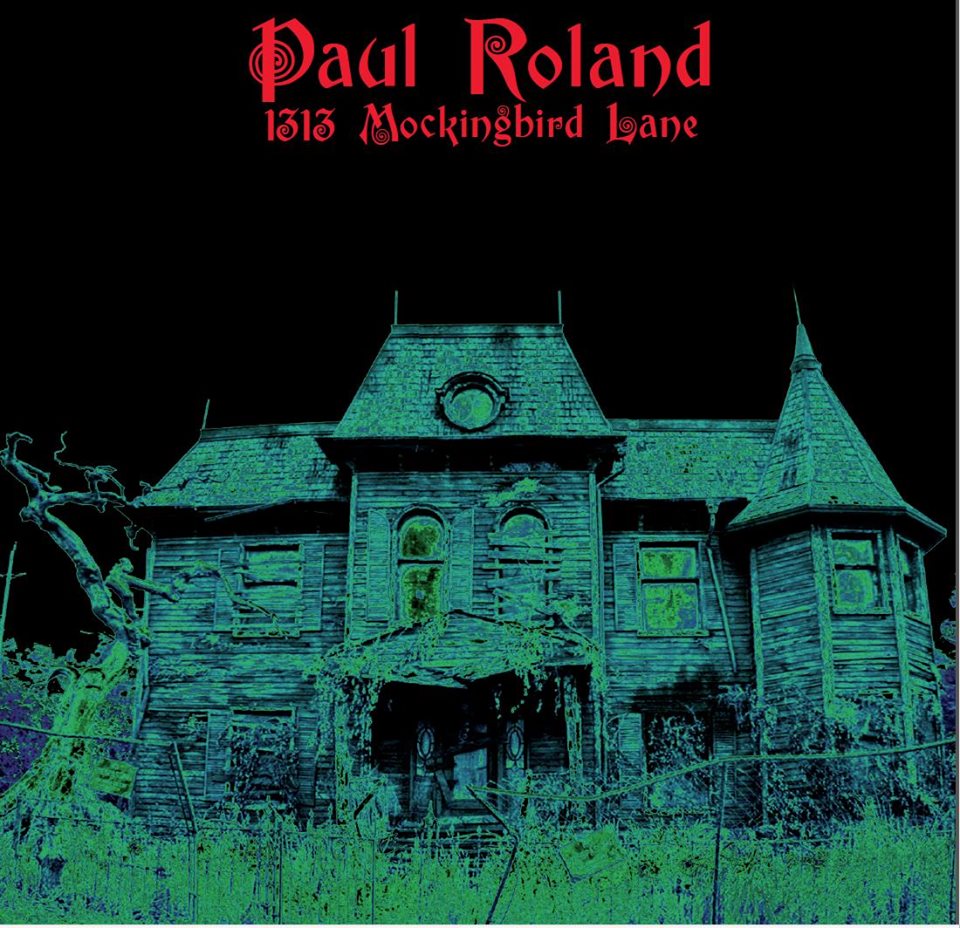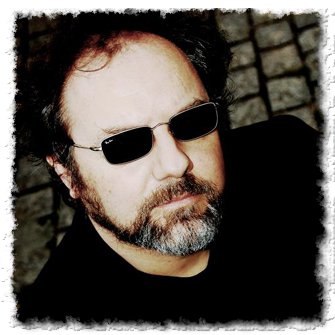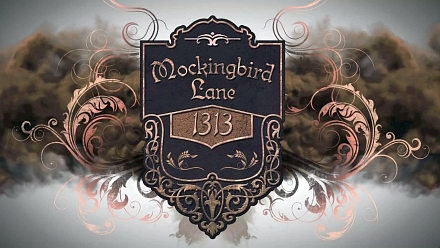Paul Roland’s 20th album 1313 Mocking Bird Lane finds him on a critical and musical high. Jason Barnard speaks to Paul to discuss how this LP fits into his 40 year musical journey.
‘1313 Mocking Bird Lane’ is one of your strongest sets of songs. How long does this material date back to – are some from your archives or are they all recently written?
I agree it’s one of my strongest albums, probably because I was in the mood to write short 3 minute psych-pop singles which means uptempo songs with quirky themes, strong hooks and short, memorable little licks and countermelodies in the instrumentation. It’s my sixties psychpop-surf album and was a lot of fun to write and record. Even the self-pitying ‘Another Ingmar Bergman Interlude’ and ‘In My Next Life’ are very tongue-in-cheek.
That’s why it was so frustrating to have it sitting on a shelf for about 4 years! I was persuaded to put it aside after recording ‘White Zombie’ in a state of the art studio in Italy because it sounded similar production-wise to ‘Bitter & Twisted’ which preceded it and the label thought it was too garage (which was intentional of course!). But after several abortive attempts to re-record it in Italy I listened to the original recordings again and told the label it was perfect as it was. I wouldn’t change anything. I told them ‘put it out, or I’ll release it’.
The only changes I made were substituting some of the weaker songs for 4 new songs recorded about a year and a half after the original album was finished and the last-minute addition of backing vocals by Anna Barbaza which does add a nice sheen to those tracks.
Do the lyrics or melodies come first?
Almost always the music then I try to find a suitable theme to fit the mood of the music. I rarely write the lyrics first unless I am so inspired that I can’t wait to write the music and instead write a sort of limerick which then needs music to be written to it. That happened with ‘Happy Families’ in 1988 because it was the story of these Victorian eccentrics which fired my imagination and not a musical idea. ‘Another Ingmar Bergman Interlude’ was the only one of the new songs to be written that way (it’s usually the humorous themes which demand the lyrics be written first) and the whole of the forthcoming M.R. James ghost stories album was written that way because I needed to tell his stories in verse first and then find the music to fit it. It’s quite a challenge to do it that way, but some themes require that approach.
What tracks from it would you like to highlight for readers and why?
All my children are beautiful to me! But if you forced me to name a few I’d have to say ‘Voodoo Man’, ‘Little White Lies’, ‘Won’t Go Surfin’ No More’ and the single ‘Summer of Love’. The first because it has a great vibe and just came so easily (they all did but that track is more of a riff based down and dirty hoodoo song so it surprised me when it snaked out of my head) while the others are simply ‘pure’ sixties psych pop and I’m a sucker for catchy San Francisco type records and as these weren’t on the jukebox I had to write them!
‘1313 Mockingbird Lane’ is the Munsters Mansion. Was The Munsters a childhood favourite of yours – what was it that you liked?
No, I wasn’t a fan. But I had seen a brief clip while visiting a friend in the late 60s and I had always associated The Munsters with the sixties. He also had those ugly Aurora monster kits that he had assembled and painted and posters of the Monkees and the Beatles on his bedroom wall, so that made a profound and lasting impression on me. I wasn’t aware of any of that iconic pop culture, other than the Adam West ‘Batman’ TV series as I was too young. And he also had a huge collection of DC horror comics which would later become my world, though I only took ‘The Puppet Master’ and ‘Blades of Battenburg’ directly from such comics as ‘Ghosts’ and ‘The Witching Hour’.
Do you record at home – were any other musicians involved?
I recorded some of the additional instruments in my home studio and that was the most fun part for me other than getting the basic tracks together with the band in a proper studio, but the four tracks at the end of the album just before the title track (tracks 9-11) are actually 4 home demos that were not intended for this project, but they allowed me to replace what I considered to be four weaker tracks to make the album even stronger and they had such a buzz about them that I had no doubts about using them. The rest of the album though is a real band working up a sweat in a room together, hence the garage sound and feel which I think is its strength. I think it will always be one of my own favourite albums, if I’m allowed to have one.
What sound did you aim to create with the LP’s production?
Live in the studio, first or second take with cleanly recorded vocals recorded over the guide vocals later on plus practically ‘live’ home demos (‘Joe Strummer Said’ is basically me and guitar recorded live with overdubs). It’s very much a flying-by-the-seat-of-your-pants attitude and I love it! I hate safe and sterile albums. In fact, recording the harmony vocals is one of the great and unexpected pleasures for me as I just open my mouth and let whatever comes into my head or mouth come out. I never work out harmonies as most bands do. That’s too much like mathematics to me. It’s a shame I didn’t know that was one of my particular and peculiar gifts, or I would have added harmony vocals to the earlier albums at the time.
Shindig Magazine recently did a highly positive retrospective on you. Given you don’t get the mainstream attention you deserve was that gratifying – does that give you added impetous for this release?
Yes, it was a very significant event for me. I had been completely ignored by the British music press other than reviews in Record Collector and finally being in a magazine like ‘Shindig’ meant a great deal to me. But it wasn’t just a standard feature, it was seven pages and the title was a thrill –‘Return of the King’. I couldn’t have asked for more.
Many people have attached labels to your music like goth and steampunk – how would you describe it?
I never set out to create a particular type of music, or to go for a sound or to appeal to a particular audience. I just wrote whatever took my fancy and treated the songs in a way that appeared appropriate to my ears and sensibilities. Its true that a recurring theme is horror, history and the supernatural, so that has linked the diverse strands together, but of course when I started in ’79 there was no steampunk or even Goth and I remember being seriously worried what people would say if I dared to use an acoustic guitar! But I wrote all my songs on an acoustic guitar and that was the real test of a song for me. If it sounded good in that bare state it had to sound even better when all the trimmings were added. The ‘trick’ was knowing what trimmings to add and that took two albums for me to learn.
How do you think your music has evolved since you first started 40 years ago?
I think it has evolved in several important aspects. Although it remains fundamentally short and simple (which I think is its strength), the lyrics have become more literary which is a result of having written so many books (although most were non-fiction) and my recently acquired keyboard skills (rudimentary in the extreme but that prevents me from playing too many notes too quickly!) has meant I can add small countermelodies and ‘licks’ to colour in the background and create little ear worms, as the Germans call them. I also made a determined effort to learn a lot of new ‘difficult’ chords (augmented 11th, diminished 9ths etc etc) to help me write the longer M.R. James ‘narrative’ songs, so my musical ‘vocabulary’ has increased. But my songs remain essentially simple and with few exceptions, quite short – something I learnt from being brought up on Glamrock!
How does writing, recording and releasing music compare today – is it easier now that you don’t need record company backing?
I have always been independent and recorded what I wanted, when I wanted then licensed the albums to the labels. But now I have a label in Italy who supply the studio and some of the musicians, so they call the tune and it is tricky to find a compromise between the number of albums they want to release (one every two years or so) and the number and frequency with which I want to release records (one every year, or even two!) I think people find it difficult to accept that an artist can write so much and still maintain a high standard. But I think they are finally coming around to accepting I don’t release anything I’m not 100 per cent happy with.
How do you manage to divide your time between writing books and recording music?
I’m just very organized. I work to a deadline on each book and when that is completed it’s playtime (meaning composing and writing songs). I’ve been very fortunate in that there is usually a break of 6-8 weeks between books when I can devote my time to other creative pursuits, such as music or writing the novel I’ve just completed which is based on one of my earliest songs (‘The Puppet Master’).
Do you have many other tracks stockpiled for future releases?
Yes, projects now seem to be overlapping more than they used to. I have a three-quarter completed ‘fantasy’ themed album for which I only have to write the lyrics and the M.R. James album is completely written and demoed, so it only needs to be re-created in the studio with first class musicians recreating my score but playing in time!
Do you have any plans to play ‘1313 Mocking Bird Lane’ live?
I have no plans to play live other than the concerts in Italy that seem to be arranged every two years, although my band are straining at the leash to play more, particularly festivals. The metal festival we played in Denmark last summer was so well received that I am tempted to play more and this time we might even get a chance to rehearse before we go on!
Further information
‘1313 Mocking Bird Lane’ is released on 6 September 2019 and is available in a limited edition of 500 golden CDs.
There is also a 4 track CD EP with 4 of the songs from the album in different mixes. The album and EP can be ordered directly from PRAS.
See also: paul-roland.bandcamp.com and Dark Companion Records.




